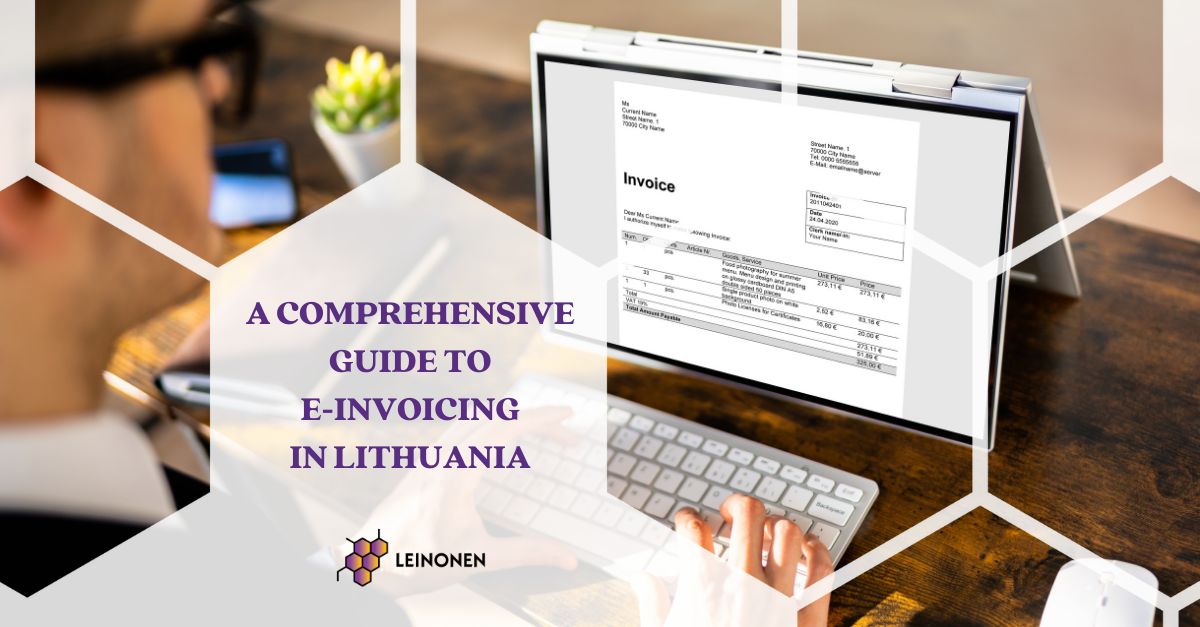A Comprehensive Guide to e-Invoicing in Lithuania. In response to a global shift towards digitization, Lithuania has embraced eInvoicing with open arms, revolutionizing the landscape of domestic finance. The Law on Public Procurement mandate, effective from July 2017, has been a pivotal change, making electronic invoicing compulsory in all B2G (business-to-government) transactions. Aligning with the EU Directive 2014/55/EU and utilizing the national eInvoicing portal eSaskaita, Lithuania stands at the forefront of digital financial management.
This transition streamlines the invoicing process and fortifies legal compliance and efficiency. As Lithuania advances, the government’s commitment to technological innovation paves the way for large-scale implementation and maintenance of eInvoicing solutions, further strengthening the country’s position in the global digital economy.
Understanding eInvoicing in Lithuania
eInvoicing in Lithuania represents a significant advance from traditional paper invoicing, integrating seamlessly into the digital era. eInvoices carry the same legal weight as their paper equivalents but are created, exchanged, and preserved entirely digitally.
The defining feature of Lithuanian e-invoices, as opposed to simple digital invoices like PDFs, is their structured data format, which is compatible with automated systems, eliminating the need for manual entry.
Lithuania’s alignment with the Peppol network since April 2019 has further standardized eInvoicing practices, enhancing interoperability for cross-border transactions. This synergy of technology ensures legal and operational uniformity. Moreover, the mandated 10-year archiving duration secures financial processes for the digital future.
Advantages of eInvoicing from a Lithuanian Business and Accountant Perspective
In Lithuania, eInvoicing marks a leap towards environmental stewardship and operational excellence. It eradicates the need for paper, significantly reducing businesses’ ecological footprint.
The digital process also boosts efficiency, curtailing manual data entry and its associated errors. Through eInvoicing, Lithuanian companies enjoy heightened accuracy in accounting practices, and the uniformity of the process ensures consistency across various departments and regions.
Furthermore, the time saved in financial transactions is substantial, allowing businesses to allocate resources to other strategic activities. Overall, eInvoicing is a testament to Lithuania’s commitment to sustainable and competitive business practices.
The Impact of eInvoicing on Accounting and Financial Management in Lithuania
The advent of eInvoicing in Lithuania has streamlined the role of accountants, allowing for a smoother, more efficient accounting process. Modern eInvoicing systems seamlessly integrate with existing accounting software, automating many tasks that were once manual.
This integration offers advanced functions like suggesting the appropriate accounts for invoice entries and automatically posting them, thereby reducing the potential for human error. As a result, accountants can issue invoices with greater speed and precision, allocating more time to strategic financial analysis and management. Basic bookkeeping takes less time and effort, enhancing the overall financial workflow.
Transitioning to eInvoicing in Lithuania
Transitioning to eInvoicing in Lithuania is a forward-looking step with a clear path for businesses. The move involves adopting accounting software capable of generating and managing eInvoices. On the other hand, companies can partner with service providers such as eSaskaita, vecticum.lt, or banqup.lt.
Lithuania’s IT infrastructure plays a crucial role in this shift, requiring minimal effort from IT personnel to integrate these modern systems. The transition falls under the purview of the Lithuanian VAT Law, which oversees the issuance, transmission, and storage of eInvoices without necessitating additional registrations or notifications to authorities.
Further supporting this transition is Lithuania’s digital tax compliance framework, including the i.MAS system. It streamlines the submission and processing of invoice data, reinforcing the efficiency and transparency of the eInvoicing ecosystem.
Ensuring Security in eInvoicing Systems
In Lithuania’s eInvoicing landscape, security is paramount, with advanced measures surpassing those of traditional invoicing. The digital signature is a critical component, mandated for all B2G transactions, and is a robust tool against fraud, ensuring the authenticity and integrity of each invoice.
While optional for the private sector, its use is a protective shield against phishing and other cyber threats. The central platform, eSaskaita, facilitates the secure exchange of eInvoices within the Peppol network and provides a decade-long archiving solution, further enhancing the security and longevity of financial records.
eInvoicing Software Solutions in Lithuania
Lithuania’s market for eInvoicing software is rich, with providers like vecticum.lt and banqup.lt offering specialized services that ensure complete integration with governmental regulations.
Essential features in eInvoicing software include compatibility with the Peppol UBL standard for seamless cross-border procurement and the ability to generate VAT data in XML format for direct submission to the tax authority’s portal.
Additionally, the software should support Peppol BIS Billing 3.0 and allow for the inclusion of all necessary VAT invoice details, such as unique serial numbers, supplier and buyer information, and detailed tax breakdowns.
With such features, companies ensure compliance with Lithuanian regulations while benefiting from the efficiency and security of modern eInvoicing solutions.
Industry-Specific Considerations for eInvoicing in Lithuania
In Lithuania, the shift to eInvoicing transcends industry boundaries, eliminating the notion of sector-specific requirements. The focus is on the digital integrity of the invoicing process, ensuring that all industries adhere to the same standards, particularly during audits and government inspections. Printed eInvoices are not recognized in official checkups, underscoring the commitment to digital reporting.
With the introduction of the i.SAF system, businesses, regardless of industry, are required to electronically submit comprehensive transactional data, following a strict schedule that aligns with VAT returns. This uniform approach simplifies compliance, promotes transparency, and underscores the digital-first ethos of Lithuania’s financial landscape.
How Leinonen Lithuania Can Facilitate Your Shift to eInvoicing
At Leinonen Lithuania, we are dedicated to guiding businesses through the transition from paper to e-invoicing. Leveraging our extensive experience in the Lithuanian marketplace, we offer personalized support and deploy the latest software solutions to integrate e-invoicing into your business seamlessly.
Our team’s mastery of local accounting standards and tax laws ensures we can manage your project from start to finish. We handle all the details, to guarantee a quick and smooth transition.
Our commitment has been demonstrated in numerous success stories, showcasing our ability to optimize financial operations for any business within Lithuania. With us, you’re choosing a partner that promises efficiency, compliance, and cost savings.
Embrace the future of invoicing by reaching out to us — let’s work together to transform your financial transactions and set a new standard for your business in the digital age.





